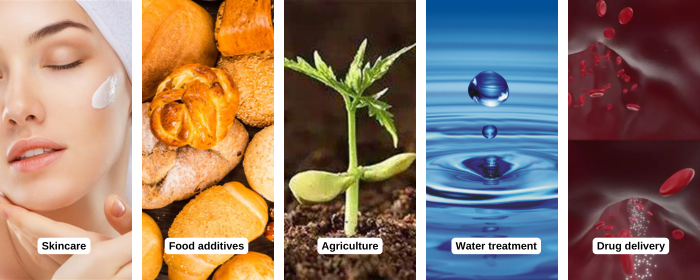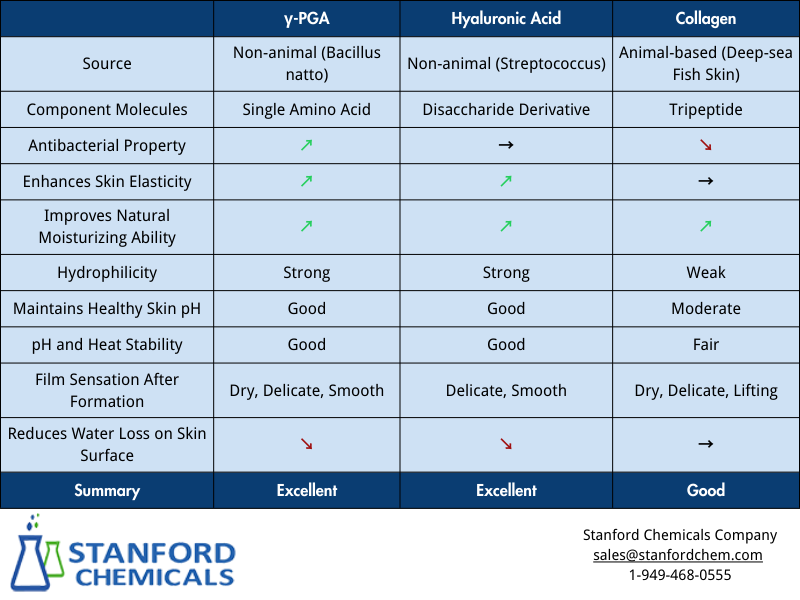5 Uses of Polyglutamic Acid: From Skincare to Agricultural Production
Polyglutamic acid (γ-PGA) is a non-toxic, eco-friendly polymer that is safe for humans. It is synthesized naturally within organisms and has excellent biocompatibility, biodegradability, and biological safety. Because of these properties, it is widely used in skincare, agriculture, food, environmental, and medical fields.
Polyglutamic Acid in Skincare: High-Efficiency Moisturizer
γ-PGA is capable of absorbing 5,000 times its weight in water; thus, it is much more effective in moisture retention compared to hyaluronic acid. It further forms a thin film on the surface of the skin to prevent water loss. In fact, one such study shows that this protecting layer may reduce water evaporation by about 10% to 20%. Besides, γ-PGA promotes the renewal of keratinocytes, reducing the impact of external irritants on the skin.
Table 1. Comparison of the skin care functions of polyglutamic acid with hyaluronic acid and collagen
Reference: Polyglutamic Acid: A “Better Alternative” to Hyaluronic Acid for Moisturizing Power
Polyglutamic Acid in the Food: Antioxidant for Extending Shelf Life
Non-toxic and tasteless, polyglutamic acid has functions of water retaining and thickening. It is mainly used in bakery products as a thickener and moisturizer, enhancing the taste of food. γ-PGA impairs starch aging by 20% to 30% and keeps the food soft and fresh. It enhances calcium absorption, increasing about 40% when combined with γ-PGA[i]. Being so, it is used worldwide in quite several functional foods and health aids. Besides, γ-PGA can increase the flavor of food and make dishes more attractive. If you enjoy eating fried foods, then consider adding gamma -PGA as it reduces body fat buildup.
Table 2. Applications and benefits of polyglutamic acid in foods
| Food Applications | Benefits |
| Baked goods | Antioxidant, not easy to soften, maintain flavor |
| Fried foods | Antioxidant, reduce body fat accumulation, retain water and juiciness |
| Cakes | Extend shelf life |
| Tea Drinks | Increase redness |
| Functional foods | Increase calcium and mineral absorption |
Polyglutamic Acid in Agriculture: The Soil Conditioner
Polyglutamic acid is a very effective conditioner for the soil and an additive to fertilizers. It improves the structure of the soil very much. Studies have shown that γ-PGA may increase the water retention of the soil by about 30% to 40%[ii], which keeps the water in the soil for longer and reduces crop stress due to drought. Besides, it accelerates the activities and reproduction of microorganisms, which increases the flow of nutrients in the soil.
Added to fertilizers, γ-PGA increases the utilization rate of fertilizers’ nutrients by 10%-15% and increases crop yield. It also enhances resistance to stress in plants, including those caused by pests and diseases. When γ-PGA is introduced into the soil, it forms a thin film on the root hair surface. This membrane protects not only the root hairs themselves but also serves as an interface for effective nutrient-water exchange to enable better nutrient absorption.
Polyglutamic Acid in Water Treatment: Natural Heavy Metal Adsorbent and Flocculant
It can function as an adsorbent of heavy metal ions and a flocculant. Its application in water treatment is mainly based on its strong heavy metal chelation and flocculation properties. For example, studies have shown that γ-PGA can realize more than 90% chelation efficiency for lead, cadmium, and mercury ions, which can significantly reduce the content of heavy metals in the water. Besides, compared with general flocculants, as a natural flocculant, γ-PGA is 20% to 25% more efficient in the removal of suspended solid and organic pollutants from water.
Polyglutamic Acid in the Medical Field: Promote Drug Delivery
In the field of medicine, γ-PGA is extensively used in drug delivery systems because it possesses excellent biocompatibility and biodegradability. According to some research, the carriers based on γ-PGA could prolong the time of drug release from 3 to 5 times and accordingly enhance the therapeutic effect. It can also be applied in surgical sutures and dressings of wounds.
During the process of degradation, there is no toxic by-product of γ-PGA, reducing inflammation and problems of infection caused after surgery. It seems that studies have shown that γ-PGA in repairing bone and other materials can increase bone tissue regeneration; the speed of bone healing can be accelerated by 15% to 20%.
Conclusion
Due to all these different applications of PGAs in skin care, food, agriculture, water treatment, and medicine, they can be considered one of the most versatile, safe, and promising natural biomaterials with huge perspectives for their applications in the future.
Stanford Chemical Company (SCC) has over 16 years of experience in manufacturing and marketing phytochemicals, pharmaceutical intermediates, catalysts, laboratory equipment, and a variety of specialty fine chemicals. The company offers a variety of skin care ingredients (polyglutamic acid, hyaluronic acid, collagen, etc.), food additives, feed additives and more. For more information, you can visit our homepage or use the search box to find the product you need.
[i] Yang, Li-Chan & wu, Jinbin & Ho, Guan-Huei & Yang, Shih-Ching & Huang, Yun-Pen & Lin, Wen-Chuan. (2009). Effects of poly-gamma-glutamic acid on calcium absorption in rats.. Bioscience, biotechnology, and biochemistry. 72. 3084-90. 10.1271/bbb.80024.
[ii] Zhang L, Yang X, Gao D, Wang L, Li J, Wei Z, Shi Y. Effects of poly-γ-glutamic acid (γ-PGA) on plant growth and its distribution in a controlled plant-soil system. Sci Rep. 2017 Jul 20;7(1):6090. doi: 10.1038/s41598-017-06248-2. PMID: 28729559; PMCID: PMC5519684.


